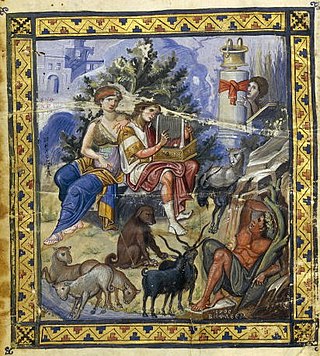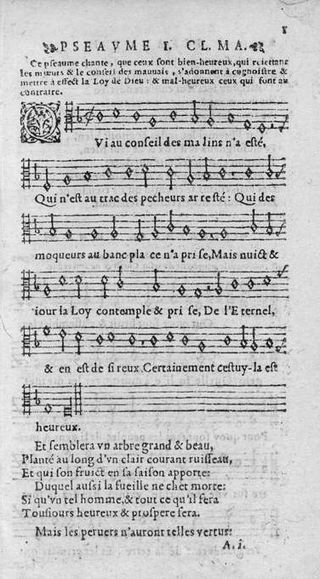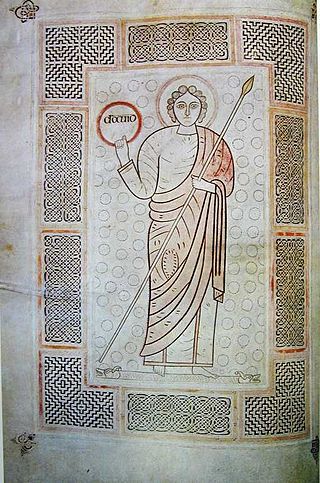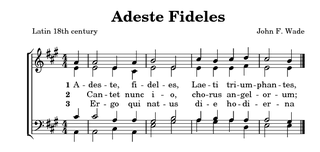
A hymn is a type of song, and partially synonymous with devotional song, specifically written for the purpose of adoration or prayer, and typically addressed to a deity or deities, or to a prominent figure or personification. The word hymn derives from Greek ὕμνος (hymnos), which means "a song of praise". A writer of hymns is known as a hymnist. The singing or composition of hymns is called hymnody. Collections of hymns are known as hymnals or hymn books. Hymns may or may not include instrumental accompaniment. Polyhymnia is the Greco/Roman goddess of hymns.

The Book of Psalms, also known as the Psalms, or the Psalter, is the first book of the third section of the Tanakh called Ketuvim ("Writings"), and a book of the Old Testament.

Christian music is music that has been written to express either personal or a communal belief regarding Christian life and faith. Common themes of Christian music include praise, worship, penitence and lament, and its forms vary widely around the world. Church music, hymnals, gospel and worship music are a part of Christian media and also include contemporary Christian music which itself supports numerous Christian styles of music, including hip hop, rock, contemporary worship and urban contemporary gospel.

A metrical psalter is a kind of Bible translation: a book containing a verse translation of all or part of the Book of Psalms in vernacular poetry, meant to be sung as hymns in a church. Some metrical psalters include melodies or harmonisations. The composition of metrical psalters was a large enterprise of the Protestant Reformation, especially in its Calvinist manifestation.

Church music is Christian music written for performance in church, or any musical setting of ecclesiastical liturgy, or music set to words expressing propositions of a sacred nature, such as a hymn.

Psalm 119 is the 119th psalm of the Book of Psalms, beginning in the English of the King James Version: "Blessed are the undefiled in the way, who walk in the law of the Lord". The Book of Psalms is in the third section of the Hebrew Bible, the Khetuvim, and a book of the Christian Old Testament. The psalm, which is anonymous, is referred to in Hebrew by its opening words, "Ashrei temimei derech". In Latin, it is known as "Beati inmaculati in via qui ambulant in lege Domini".

Psalm 23 is the 23rd psalm of the Book of Psalms, beginning in English in the King James Version: "The Lord is my shepherd". In Latin, it is known by the incipit, "Dominus regit me". The Book of Psalms is part of the third section of the Hebrew Bible, and a book of the Christian Old Testament. In the slightly different numbering system used in the Greek Septuagint and Latin Vulgate translations of the Bible, this psalm is Psalm 22.
Decisions concerning the conduct of public worship in the Church of Scotland are entirely at the discretion of the parish minister. As a result, a wide variety of musical resources are used. However, at various times in its history, the General Assembly has commissioned volumes of psalms and hymns for use by congregations.

Exclusive psalmody is the practice of singing only the biblical Psalms in congregational singing as worship. Today it is practised by several Protestant, especially Reformed denominations. Hymns besides the Psalms have been composed by Christians since the earliest days of the church, but psalms were preferred by the early church and used almost exclusively until the end of the fourth century. During the Protestant Reformation, Martin Luther and many other reformers, including those associated with the Reformed tradition, used hymns as well as psalms, but John Calvin preferred the Psalms and they were the only music allowed for worship in Geneva. This became the norm for the next 200 years of Reformed worship. Hymnody became acceptable again for the Reformed in the middle of the nineteenth century, though several denominations, notably the Reformed Presbyterians, continue the practice of exclusive psalmody.

The Genevan Psalter, also known as the Huguenot Psalter, is a 1539 metrical psalter in French created under the supervision of John Calvin for liturgical use by the Reformed churches of the city of Geneva in the sixteenth century.
The Trinity Hymnal is a Christian hymnal written and compiled both by and for those from a Presbyterian background. It has been released in two editions and is published by Great Commission Publications, a joint project between the Orthodox Presbyterian Church and the Presbyterian Church in America.

Psalm 100 is the 100th psalm in the Book of Psalms in the Tanakh. In English, it is translated as "Make a joyful noise unto the Lord, all ye lands" in the King James Version (KJV), and as "O be joyful in the Lord, all ye lands" in the Book of Common Prayer (BCP). Its Hebrew name is מִזְמוֹר לְתוֹדָה, 'Mizmor l'Todah' and it is subtitled a "Psalm of gratitude confession". In the slightly different numbering system in the Greek Septuagint version of the Bible, and in the Latin Vulgate, this psalm is Psalm 99. In the Vulgate, it begins Jubilate Deo, or Jubilate, which also became the title of the BCP version.

A hymn tune is the melody of a musical composition to which a hymn text is sung. Musically speaking, a hymn is generally understood to have four-part harmony, a fast harmonic rhythm, with or without refrain or chorus.
Presbyterian worship documents worship practices in Presbyterian churches; in this case, the practices of the many churches descended from the Scottish Presbyterian church at the time of the Reformation.

"The Lord's My Shepherd" is a Christian hymn. It is a metrical psalm commonly attributed to the English Puritan Francis Rous and based on the text of Psalm 23 in the Bible. The hymn first appeared in the Scots Metrical Psalter in 1650 traced to a parish in Aberdeenshire.

Psalm 1 is the first psalm of the Book of Psalms, beginning in the English King James Version: "Blessed is the man", and forming "an appropriate prologue" to the whole collection according to Alexander Kirkpatrick. The Book of Psalms is part of the third section of the Hebrew Bible, and a book of the Christian Old Testament. In Latin, this psalm is known as "Beatus vir" or "Beatus vir, qui non abiit".
Reformed worship is religious devotion to God as conducted by Reformed or Calvinistic Christians, including Presbyterians. Despite considerable local and national variation, public worship in most Reformed and Presbyterian churches is governed by the Regulative principle of worship.

Church music in Scotland includes all musical composition and performance of music in the context of Christian worship in Scotland, from the beginnings of Christianisation in the fifth century, to the present day. The sources for Scottish Medieval music are extremely limited due to factors including a turbulent political history, the destructive practices of the Scottish Reformation, the climate and the relatively late arrival of music printing. In the early Middle Ages, ecclesiastical music was dominated by monophonic plainchant, which led to the development of a distinct form of liturgical Celtic chant. It was superseded from the eleventh century by more complex Gregorian chant. In the High Middle Ages, the need for large numbers of singing priests to fulfill the obligations of church services led to the foundation of a system of song schools, to train boys as choristers and priests. From the thirteenth century, Scottish church music was increasingly influenced by continental developments. Monophony was replaced from the fourteenth century by the Ars Nova consisting of complex polyphony. Survivals of works from the first half of the sixteenth century indicate the quality and scope of music that was undertaken at the end of the Medieval period. The outstanding Scottish composer of the first half of the sixteenth century was Robert Carver, who produced complex polyphonic music.
Church music during the Reformation developed during the Protestant Reformation in two schools of thought, the regulative and normative principles of worship, based on reformers John Calvin and Martin Luther. They derived their concepts in response to the Catholic church music, which they found distracting and too ornate. Both principles also pursued use of the native tongue, either alongside or in place of liturgical Latin.

The Scottish Psalter of 1564 was the first psalter or psalm book to be published in Scotland. It was published by the Church of Scotland under the influence of John Knox as part of the Book of Common Order which was a more general directory for public worship. The precise details concerning the publication of the Scottish Psalter are not known as the early records of the Church of Scotland are lost. However, it appears that its publication was determined at the Church's General Assembly in December 1562.












